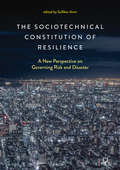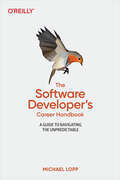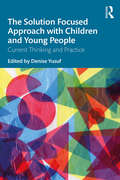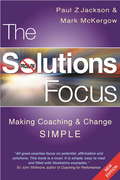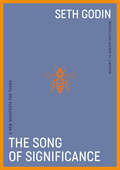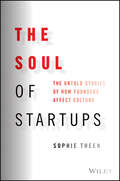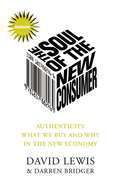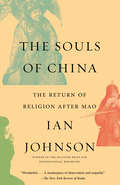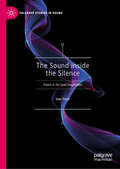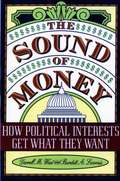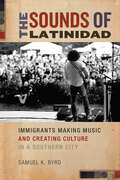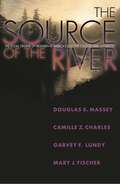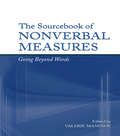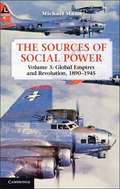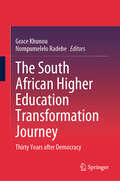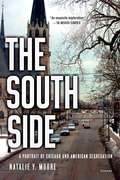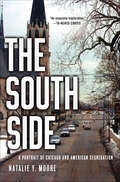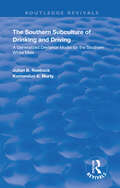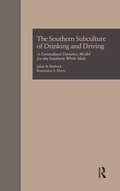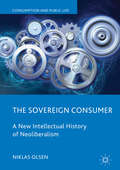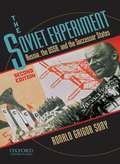- Table View
- List View
The Sociotechnical Constitution of Resilience: A New Perspective On Governing Risk And Disaster
by Sulfikar AmirThis book considers the concept of resilience in a global society where coping with the consequence and long term impact of crisis and disaster challenges the capacity of communities to bounce back in the event of severe disruption. Catastrophic events such as the 9.11 terrorist attack, the Fukushima nuclear disaster, and the volcano eruption in Central Java entailed massive devastation on physical infrastructures, and caused significant social and economic damage. This book considers how the modern sociotechnological system facilitating human activity defines how societies survive and whether a crisis will be short-lived or prolonged. Drawing on the concept of sociotechnical resilience, this book closely examines a range of events North America, Asia, Australia, and Europe. By presenting the successes and failures of sociotechnical resilience, it offers important insights and practical lessons to build better and comprehensive understandings of resilience in a real-world setting, significantly contributing to the study of disaster resilience.
The Software Developer's Career Handbook: A Guide to Navigating the Unpredictable
by Michael LoppAt some point in your career, you'll realize there's more to being a software engineer than dealing with code. Is it time to become a manager? Or join a startup? In this insightful and entertaining book, Michael Lopp recalls his own make-or-break moments with Silicon Valley giants such as Apple, Slack, Pinterest, Palantir, Netscape, and Symantec to help you make better, more mindful career decisions.With more than 40 stand-alone stories, Lopp walks through a complete job lifecycle, starting with the interview and ending with the realization that it might be time to move on. You'll learn how to handle baffling circumstances in your job, understand what you want from your career, and discover how to thrive in your workplace.Learn how to navigate areas of your job that don't involve writing codeIdentify how the aspects you enjoy will affect your next career stepsBuild and maintain key relationships and interactions within your communityMake choices that will help you have a "deliberate career"Recognize what's important to your manager and work on things that matter
The Software Requirements Memory Jogger: A Pocket Guide to Help Software and Business Teams Develop and Manage Requirements
by Ellen GottesdienerThe Software Requirements Memory Jogger is an easy-to-use guide for developing and managing precise software requirements. The Software Requirements Memory Jogger provides every member of your project team with the tools and techniques to foster communication between business and technical teams on the necessary requirements for producing successful software. The Software Requirements Memory Jogger will benefit all stakeholders at any organizational level involved in software development projects management team, practitioners, QA/QC personnel. - Explore practical steps, tips, and examples to help you develop and manage requirements - Follow the User Requirements Roadmap a toolkit of techniques for discovering and analyzing user requirements - Streamline communications between all requirements stakeholders - Learn how to write clear, concise requirements documents
The Solution Focused Approach with Children and Young People: Current Thinking and Practice
by Denise YusufThe Solution Focused Approach with Children and Young People: Current Thinking and Practice brings together leading figures and innovative practitioners from different professions, contexts and countries to provide a unique overview of Solution Focused work with children and young people. Presenting a range of applications in individual, group and community work, it puts the spotlight on diverse fields, exploring how the Solution Focused approach can work in real-world contexts. This book showcases a powerful, engaging approach which helps children and young people find the resources and strengths to manage difficulties and make the most of their lives. It contains interesting case studies, narrative descriptions of original practice, programmes of work developed using Solution Focused principles, and thought-provoking discussions of key elements of practice. With chapters presenting perspectives from coaching, therapy, consultancy and education, and applications including learning assessments, child protection, bereavement, edge of care, and youth offending, the book provides an overview of the current state of practice and provides pointers to potential new developments. The Solution Focused Approach with Children and Young People will help both experienced practitioners and those new to the approach to develop and update their knowledge and skills, as well as introducing them to creative and cutting-edge tools to inspire fresh ideas and thinking. It will be essential reading for Solution Focused practitioners and students, as well as coaches, social workers, school counsellors and mental health professionals working with children and young people.
The Solutions Focus: Making Coaching and Change SIMPLE (People Skills For Professionals Ser.)
by Paul Z. Jackson Mark McKergowThis is a new and updated edition of this acclaimed first business book on the powerful, simple yet subtle approach to positive change in people, teams and organisations. Used around the world by a wide range of people, professions and organisations, the first edition has now sold nearly 10,000 copies and been translated into 7 languages. Including new chapters reflecting the increasing importance of coaching and the solutions focus movement in the business environment, this wide-ranging book is filled with all the most important ideas, case examples and practical tips for managers, facilitators and consultants. Proven in many fields and with a distinguished intellectual heritage, "The Solutions Focus" provides a simple and direct route to progress in your organisation. It focuses on: solutions - not problems; in between: the action is in the interaction; make use of what's there; possibilities - past, present and future; and language. Every case is different. The trouble with traditional approaches to people problems is that they assume a straightforward relationship between cause and effect, between a problem and its solution. A solutions-focused approach sidesteps the search for the causes of a problem and heads straight for the solution, showing you how to envisage your preferred future and quickly takes steps forward. The authors present a set of practical techniques, including specific forms of questioning that lead to immediate action and results. They show how to identify what is working in your organisation and amplify it to make useful changes; to focus on what is possible rather than what is intractable and how to be solution focused, not solution forced.
The Song of Significance: A New Manifesto for Teams
by Seth GodinA soulful re-envisioning of what work and leadership can be, from the visionary mind of renowned author and thought leader, Seth GodinThe Song of Significance is a rousing contemplation on work: why it is the way it is, why it&’s gotten so bad, what all of us–especially leaders–can do to make it better.Economic instability and the rise of remote work have left us disconnected and disengaged. Alarmed managers are responding with harsh top-down edicts, layoffs, surveillance and mandatory meetings. Workers are responding by quiet quitting and working their wage. But it doesn't have to be this way.Through 144 provocative stanzas, legendary business author Seth Godin gets to the heart of what ails us; he shows what&’s really at the root of these trends, and challenges us to do better in ways that matter.The choice is simple. We can endure the hangover of industrial capitalism, keep treating people as disposable, and join in the AI-fueled race to the bottom. Or we come together to build a significant organization that enrolls, empowers, and trusts everyone to deliver their best work, no matter where they are.This is a book to share with bosses and co-workers, to discuss and put to action. No matter what our role, it&’s within our power to change. Because, as Godin writes, &“Humans aren&’t a resource. They are the point.&”
The Sopranos
by Franco RicciOften hailed as one of the greatest television series of all time, The Sopranos is a product of its time, firmly embedded in the problems of post-industrial, post-ethnic America. In The Sopranos: Born under a Bad Sign, Franco Ricci examines the groundbreaking HBO series and its impact as a cultural phenomenon.Ricci demonstrates an encyclopedic knowledge of the series, the genre, and their social context in his analysis of the show's complex themes and characters. He explores The Sopranos' deep engagement with problems of race, class, gender, and identity, specifically in its portrayal of the Italian-American experience, consumer and media-driven society, and contemporary psychosocial issues. The series' protagonist, Mafia boss and patriarch Tony Soprano, in many ways embodies the anxieties of our age. Focusing on Tony's internal struggles and interactions with his therapist, family, and associates, Ricci traces this archetypal character's existential conflicts and sheds light on his search for self, connection, and meaning.Comprehensive in scope and sophisticated in approach, The Sopranos: Born under a Bad Sign is richly rewarding reading for anyone with an interest in the popular television drama, both as entertainment and social commentary.
The Soul of Startups: The Untold Stories of How Founders Affect Culture
by Sophie TheenDiscover how a founder&’s personality can impact the culture of a startup In The Soul of Startups: The Untold Stories of How Founders Affect Culture, award-winning HR and diversity and inclusion professional Sophie Theen delivers an insightful and eye-opening discussion of the importance of culture in the vibrant and, sometimes, chaotic world of startup enterprise. In the book, you&’ll hear from a people management expert who has sat alongside those who launch exciting new ventures. The author describes company founders who lacked the emotional maturity and intelligence to start an organization on which an entire team would rely for their wellbeing, as well as those who excelled at creating environments that allowed their team members to thrive, personally and professionally. You&’ll also find: Unvarnished truths from people who have lived through the ups and downs of the startup experience Celebrations of the people who have worked for—and with—the celebrity CEOs to help them realize their vision Illuminating stories of the journeys of startup operators, including the good, the bad, and the uglyA can&’t-miss resource for company founders, entrepreneurs, managers, executives, and startup professionals, The Soul of Startups also belongs in the libraries of human resources and people management professionals seeking unique insights into how the personalities of startup founders shape the structures, processes, and realities of working in a fast-growing company.
The Soul of the New Consumer
by David Lewis Darren BridgerNew consumers are revolutionizing the world of business, our culture norms and our social expectations. No longer confined by gender, age, ethnicity or income, new consumers are breaking down barriers, shattering stereotypes and redefining the marketplace and the very meaning of consumerism. From traditional to online retailing, from tracking "coolhunters" to exploring "tastespace," The Soul of the New Consumer: Authenticity - What We Buy and Why in the New Economy by David Lewis and Darren Bridger unearths the essence of new consumer behavior, explores the drive for authenticity over commodity and goes far beyond the simple concepts of how and what to answer the most important question of all - why? In an affluent world saturated with affordable products there are three new scarcities - time, attention and trust. Over the past decade, Lewis and Bridger have been at the forefront of researching these new consumers and, here, they report their observations. For companies large and small, no matter what their service or product, The Soul of the New Consumer provides the first profile of the independent, involved and well-informed new consumer who is challenging the way marketing, selling and business are done.
The Soul of the Organization
by David B. ZenoffUsing Mac OS Mavericks ?is the essential guide to using a computer running Mavericks, providing a complete resource for both the beginner and the enthusiast. Techniques are step-by-step using photography and screen prints throughout, together with concise, easy to follow text from an established expert in the field, provide a comprehensive guide to Apple Macs. Whether you have just bought your first Mac, switched from Windows, or are a keen computer user, this book will provide you with a firm grasp of the underpinning foundations and equip you with the skills needed to use a Mac like a pro. ?
The Souls of China: The Return of Religion After Mao
by Ian JohnsonFrom the Pulitzer Prize–winning journalist, a revelatory portrait of religion in China today—its history, the spiritual traditions of its Eastern and Western faiths, and the ways in which it is influencing China’s future. The Souls of China tells the story of one of the world’s great spiritual revivals. Following a century of violent anti-religious campaigns, China is now filled with new temples, churches, and mosques—as well as cults, sects, and politicians trying to harness religion for their own ends. Driving this explosion of faith is uncertainty—over what it means to be Chinese and how to live an ethical life in a country that discarded traditional morality a century ago and is searching for new guideposts.Ian Johnson first visited China in 1984; in the 1990s he helped run a charity to rebuild Daoist temples, and in 2001 he won a Pulitzer Prize for his coverage of the suppression of the Falun Gong spiritual movement. While researching this book, he lived for extended periods with underground church members, rural Daoists, and Buddhist pilgrims. Along the way, he learned esoteric meditation techniques, visited a nonagenarian Confucian sage, and befriended government propagandists as they fashioned a remarkable embrace of traditional values. He has distilled these experiences into a cycle of festivals, births, deaths, detentions, and struggle—a great awakening of faith that is shaping the soul of the world’s newest superpower.
The Sound inside the Silence: Travels in the Sonic Imagination (Palgrave Studies in Sound)
by Seán StreetIn this poetic exploration of the auditory imagination, the third in his series on sonic aesthetics, Seán Street peoples silence with sound, travelling through time and space to the distant past, the infinite future and the shadow lands of the inner psyche. Our mind is a canvas on which the colours of the sound world leave permanent impressions. It is the root of all listening.
The Sound of Money: How Political Interests Get What They Want
by Darrell M. West Burdett A. LoomisIn their compelling new book, The Sound of Money: How Political Interests Get What They Want, West and Loomis probe the connection between interest-group spending and congressional policy making. In recent years, important battles have been fought over health care reform, telecommunications deregulation, and Medicare, to name just a few. The interest groups most successful at influencing policy are those with the most money to spend on advertising and lobbying. West and Loomis caution that as the "sound" of money in American politics grows louder, this new group activism will increasingly affect-and maybe even threaten-the viability of representative government.
The Sounds of Latinidad: Immigrants Making Music and Creating Culture in a Southern City (Social Transformations in American Anthropology #4)
by Samuel K. ByrdThe Sounds of Latinidad explores the Latino music scene as a lens through which to understand changing ideas about latinidad in the New South. Focusing on Latino immigrant musicians and their fans in Charlotte, North Carolina, the volume shows how limited economic mobility, social marginalization, and restrictive immigration policies have stymied immigrants' access to the American dream and musicians' dreams of success. Instead, Latin music has become a way to form community, debate political questions, and claim cultural citizenship. The volume illuminates the complexity of Latina/o musicians' lives. They find themselves at the intersection of culture and politics, often pushed to define a vision of what it means to be Latino in a globalizing city in the Nuevo South. At the same time, they often avoid overt political statements and do not participate in immigrants' rights struggles, instead holding a cautious view of political engagement. Yet despite this politics of ambivalence, Latina/o musicians do assert intellectual agency and engage in a politics that is embedded in their musical community, debating aesthetics, forging collective solidarity with their audiences, and protesting poor working conditions. Challenging scholarship on popular music that focuses on famous artists or on one particular genre, this volume demonstrates how exploring the everyday lives of ordinary musicians can lead to a deeper understanding of musicians' role in society. It argues that the often overlooked population of Latina/o musicians should be central to our understanding of what it means to live in a southern U.S. city today.
The Source of the River: The Social Origins of Freshmen at America's Selective Colleges and Universities (The William G. Bowen Series #43)
by Douglas S. Massey Garvey Lundy Mary J. Fischer Camille Z. CharlesAfrican Americans and Latinos earn lower grades and drop out of college more often than whites or Asians. Yet thirty years after deliberate minority recruitment efforts began, we still don't know why. In The Shape of the River, William Bowen and Derek Bok documented the benefits of affirmative action for minority students, their communities, and the nation at large. But they also found that too many failed to achieve academic success. In The Source of the River, Douglas Massey and his colleagues investigate the roots of minority underperformance in selective colleges and universities. They explain how such factors as neighborhood, family, peer group, and early schooling influence the academic performance of students from differing racial and ethnic origins and differing social classes. Drawing on a major new source of data--the National Longitudinal Survey of Freshmen--the authors undertake a comprehensive analysis of the diverse pathways by which whites, African Americans, Latinos, and Asians enter American higher education. Theirs is the first study to document the different characteristics that students bring to campus and to trace out the influence of these differences on later academic performance. They show that black and Latino students do not enter college disadvantaged by a lack of self-esteem. In fact, overconfidence is more common than low self-confidence among some minority students. Despite this, minority students are adversely affected by racist stereotypes of intellectual inferiority. Although academic preparation is the strongest predictor of college performance, shortfalls in academic preparation are themselves largely a matter of socioeconomic disadvantage and racial segregation. Presenting important new findings, The Source of the River documents the ongoing power of race to shape the life chances of America's young people, even among the most talented and able.
The Sourcebook of Nonverbal Measures: Going Beyond Words
by Valerie ManusovThe Sourcebook of Nonverbal Measures provides a comprehensive discussion of research choices for investigating nonverbal phenomena. The volume presents many of the primary means by which researchers assess nonverbal cues. Editor Valerie Manusov has collected both well-established and new measures used in researching nonverbal behaviors, illustrating the broad spectrum of measures appropriate for use in research, and providing a critical resource for future studies.With chapters written by the creators of the research measures, this volume represents work across disciplines, and provides first-hand experience and thoughtful guidance on the use of nonverbal measures. It also offers research strategies researchers can use to answer their research questions; discussions of larger research paradigms into which a measure may be placed; and analysis tools to help researchers think through the research choices available to them.With its thorough and pragmatic approach, this Sourcebook will be an invaluable resource for studying nonverbal behavior. Researchers in interpersonal communication, psychology, personal relationships, and related areas will find it to be an essential research tool.
The Sources of Social Power
by Michael MannDistinguishing four sources of power – ideological, economic, military and political – this series traces their interrelations throughout human history. This third volume of Michael Mann's analytical history of social power begins with nineteenth-century global empires and continues with a global history of the twentieth century up to 1945. Mann focuses on the interrelated development of capitalism, nation-states and empires. Volume 3 discusses the 'Great Divergence' between the fortunes of the West and the rest of the world; the self-destruction of European and Japanese power in two world wars; the Great Depression; the rise of American and Soviet power; the rivalry between capitalism, socialism and fascism; and the triumph of a reformed and democratic capitalism.
The South African Higher Education Transformation Journey: Thirty Years after Democracy
by Grace Khunou Nompumelelo RadebeThis book explores the transformation of the South African higher education system 30 years after democracy. It examines the progress, tensions, and possibilities through a detailed analysis of how inclusion, curriculum transformation, and epistemological shifts have shaped—and continue to shape—South African higher education. The chapters draw on a range of theoretical frameworks, including decolonization, Africanization, and intersectionality. The book argues that while the South African higher education system has made significant strides in expanding access and fostering critical engagement, the journey toward full transformation remains an ongoing endeavor. The conclusions reached in the book suggest that deep inclusion, meaningful curriculum transformation, and epistemic justice require sustained institutional commitment, policy alignment, and active engagement with students, academics, and society at large.
The South Side: A Portrait of Chicago and American Segregation
by Natalie Y. MooreChicago-native Natalie Moore shines a light on contemporary segregation in the city's South Side; with a memoirist's eye, she showcases the lives of these communities through the stories of people who reside there. The South Side shows the impact of Chicago's historic segregation - and the ongoing policies that keep the system intact.
The South Side: A Portrait of Chicago and American Segregation
by Natalie Y. Moore**One of Buzzfeed's 18 Best Nonfiction Books Of 2016**A lyrical, intelligent, authentic, and necessary look at the intersection of race and class in Chicago, a Great American CityIn this intelligent and highly important narrative, Chicago-native Natalie Moore shines a light on contemporary segregation in the city's South Side; with a memoirist's eye, she showcases the lives of these communities through the stories of people who reside there. The South Side shows the impact of Chicago's historic segregation - and the ongoing policies that keep the system intact.
The Southern Subculture of Drinking and Driving: A Generalized Deviance Model for the Southern White Male (Current Issues In Criminal Justice Ser.)
by Julian B. Roebuck Komanduri S. MurtyFirst published in 1996. The Southern Subculture of Drinking and Driving is part of the Criminal Justice series. Volumes in the Current Issues in Criminal Justice series focus on scholarship, original thought and research, and readability. This one is no different. Julian B. Roebuck and Komanduri S. Murty have produced a volume that will be of vital interest to those who study and create policy on drunken driving one of the more enduring social problems of the past two decades. The volume has two major components that make it unique in the drunken driving literature. First, Roebuck and Murty focus on drunken drivers themselves and, through the use of a large dataset, add to our knowledge of that group of people by describing their characteristics. Second, and perhaps more important, Roebuck and Murty delve into the phenomenology of the drunken driver through a lengthy interview process.
The Southern Subculture of Drinking and Driving: A Generalized Deviance Model for the Southern White Male (Current Issues in Criminal Justice)
by Julian B. Roebuck Komanduri S. MurtyFirst published in 1996. The Southern Subculture of Drinking and Driving is part of the Criminal Justice series. Volumes in the Current Issues in Criminal Justice series focus on scholarship, original thought and research, and readability. This one is no different. Julian B. Roebuck and Komanduri S. Murty have produced a volume that will be of vital interest to those who study and create policy on drunken driving ・ one of the more enduring social problems of the past two decades. The volume has two major components that make it unique in the drunken driving literature. First, Roebuck and Murty focus on drunken drivers themselves and, through the use of a large dataset, add to our knowledge of that group of people by describing their characteristics. Second, and perhaps more important, Roebuck and Murty delve into the phenomenology of the drunken driver through a lengthy interview process.
The Sovereign Consumer: A New Intellectual History of Neoliberalism (Consumption and Public Life)
by Niklas OlsenThis book presents a new intellectual history of neoliberalism through the exploration of the sovereign consumer. Invented by neoliberal thinkers in the interwar period, this figure has been crucial to the construction and legimitization of neoliberal ideology and politics.Analysis of the sovereign consumer across time and space demonstrates how neoliberals have linked the figure both to the idea of democracy as a method of choice, and also to a re-invention of the market as the democratic forum par excellence. Moreover, Olsen contemplates how the sovereign consumer has served to marketize politics and functioned as a major driver in a wide-ranging transformation in political thinking, subjecting traditional political values to the narrow pursuit of economic growth. A politically timely project, The Sovereign Consumer will have a wide appeal in academic circles, especially for those interested in consumer and welfare studies, and in political, economic and cultural thought in the twentieth century.
The Soviet Experiment: Russia, The USSR, And The Successor States
by Ronald SunyThe West has always had a difficult time understanding the Soviet Union. For decades Americans have known a Soviet Union clouded by ideological passions and a dearth of information. Today, with the revelations under glasnost and the collapse of the Communist empire, Americans are now able tosee the former Soviet Union as a whole, and explore the turbulent tale of a Soviet history that has a beginning, a middle, and an end. One of the eminent Soviet historians of our time, Ronald Grigor Suny takes us on a journey that examines the complex themes of Soviet history from the last tsar of the Russian empire to the first president of the Russian republic. He examines the legacies left by former Soviet leaders andexplores the successor states and the challenges they now face. Combining gripping detail with insightful analysis, Suny focuses on three revolutions: the tumultuous year of 1917 when Vladimir Lenin led the Bolshevik takeover of the tsarist empire; the 1930s when Joseph Stalin refashioned theeconomy, the society, and the state; and the 1980s and 1990s when Mikhail Gorbachev's ambitious and catastrophic attempt at sweeping reform and revitalization resulted in the breakup of the Soviet Union led by Boris Yeltsin. He unravels issues, explaining "deeply contradictory" policies toward thevarious Soviet nationalities, including Moscow's ambivalence over its own New Economic Policy of the 1920s and the attempts at reform that followed Stalin's death. He captures familiar as well as little-known events, including the movement of the crowds on the streets of St. Petersburg in theFebruary revolution; Stalin's collapse into a near-catatonic state after Hitler's much-predicted invasion; and Yeltsin's political maneuvering and public grandstanding as he pushed the disintegration of the Soviet Union and faced down his rivals. Students and social scientists alike continue to be fascinated by the Soviet experiment and its meaning. The Soviet Experiment recovers the complexities and contradictions of the 70 years of Soviet Power, exploring its real achievements as well as its grotesque failings. Clearly written andwell-argued, this narrative is complete with helpful anecdotes and examples that will not only engage students and offer them an opportunity to learn from new material but also afford them the opportunity to form their own opinions by reading the text and looking into the suggested readings. Withinsight and detail, Suny has constructed a masterful work, providing the fullest account yet of one of the greatest transformations of modern history.
The Space Value of Money: Rethinking Finance Beyond Risk & Time
by Armen V. PapazianThe Space Value of Money introduces a fresh and innovative perspective on sustainability and finance. It expands our financial value framework, heretofore built around risk and time, by factoring in space, as an analytical dimension and our physical context. The proposed principle and metrics entrench our responsibility for space impact into our value equations, making finance inherently sustainable and acting as a theoretical bridge between core finance theory and the growing field of sustainable finance or ESG integration. The book offers a novel approach to value design, measurement, and creation, discussing the theoretical, mathematical, institutional, technological and data elements of the transformation.The Space Value of Money principle and metrics offer us the opportunity to adjust our financial value framework and transform human productivity in line with our sustainability targets. They also enable the design and engineering of the financial instruments that can help us address our evolutionary challenges/investment, like the transition to Net Zero.“Every once in a while, a book comes along that makes a fundamental contribution that is both profound and practical. A book that every member of the National Space Council, including the NASA Administrator and the Space Force chief of space operations should read. The Space Value of Money will be of interest to ESG and impact investors, government regulators, financial theorists, and outer space enthusiasts.” —Lt Col Peter Garretson, Senior Fellow in Defense Studies at the American Foreign Policy Council“No doubt, the pressing environmental challenges we face make the concept of the space impact of investments even more compelling.” —Dr. Pascal Blanqué, Chairman of Amundi Institute, Former Group CIO of Amundi Asset Management“The Space Value of Money brings much needed conceptual rigour, whilst further advocating the case for a new paradigm shift in financial valuation. This work gives us the lasting frameworks that aggregate impact across all spatial dimensions. Dr. Papazian culminates over ten years of research in this rich book, providing the springboard for further innovation and system implementation in this area.” —Domenico Del Re, Director, Sustainability and Climate Change, PwC“Enthralling and captivating. Papazian offers a clear, thorough, and comprehensive discussion. The Space Value of Money gives us an opportunity to reframe our thinking and to explore what is possible. A great read!” —Daud Vicary, Founding Trustee of the Responsible Finance and Investment Foundation“Armen has developed a novel way to create financial models that are better suited to dealing with the many parameters required if we are to properly consider environmental factors and sustainability in economics and finance. I have found this engaging and look forward to seeing its future use.” —Dr. Keith Carne, First Bursar, King’s College, Cambridge University
